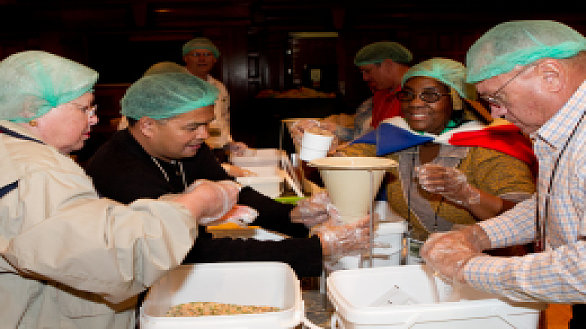Photo: Participants in the World Methodist Conference in Durban, South Africa, place dehydrated meals into plastic packets, seal them and prepare them for delivery to school children in the area. Photo courtesy of Ken Howle, World Methodist Council.
DURBAN, South Africa –– Participants in the World Methodist Conference here packaged 101,000 dehydrated meals for distribution to local school children.
Conference participants filled and sealed Stop Hunger Now (www.stophungernow.org) plastic packets with dehydrated rice, soy, vegetables, flavoring and 21 essential vitamins and minerals during six 2-hour packaging sessions held August 4, 5 and 6.
The 500-member World Methodist Council met Aug. 1-3; that legislative gathering was followed by the World Methodist Conference in which members of all churches from the Wesleyan tradition are invited. Both events are held once every five years.
Interest and participation in the food packaging event increased during the Aug. 4-8 conference. News of the packaging progress was reported daily, and in the final meal packaging session, the goal of 100,000 meals was met and applauded.
Meals delivered
On August 5, a team of conference attendees delivered thousands of meals to Addington Primary School in Durban. Some who had helped package the meals sat down to eat with the children.
“Many children who attend this school are refugees, and have very little to eat,” said Larry Malone, president of the World Methodist Council men’s affiliate and a leading architect of the packaging event. “It was heartwarming.”
Local packaging operations were handled by Stop Hunger Now South Africa, under the leadership of national director Barry Mey. South Africa is the first international affiliate of Raleigh N.C.-based Stop Hunger Now.
Financial support for the packaging event was provided by United Methodist Men, Korean Methodist Men, the United Methodist Committee on Relief, the Mississippi Annual Conference, and Good Samaritan Korean Methodist Church in Incheon.
Resolution
The idea for a packaging event began in Seoul, South Korea during a 2006 gathering of the World Methodist men’s affilliate. Malone challenged the men to the mission of eliminating world hunger in partnership with Stop Hunger Now. During this conference, the men raised the bar with a call to the world Wesleyan family to commit to fast at least one meal per week, pray during that meal period for all who are hungry, and to give the cost of one meal daily in a sustained commitment to a Christian hunger-related ministry.
Malone asked the World Methodist Council to issue the same call to churches in member denominations. The Rev. Ray Buchanan, founder of Stop Hunger Now, also told the council of the ravaging effects of severe hunger and starvation contrasted with a world of abundance enjoyed by many affluent Christians.
The council responded with a resolution noting that a person dies every 6 seconds from hunger related causes, and the earth produces enough food for everyone. Members called all churches in the Wesleyan tradition to fast, pray and give so others may live.
Special encouragement for the packaging process came through a chance encounter between Malone and a Nqoba Nkabinde, an executive of South Africa-based Dee-Dee Enterprises, on the flight to Durban preceding the conference. Chats during the flight led to a friendship, and Malone invited Nkabinde to join the packaging event. Convinced of the importance and effectiveness of the process, Nkabinde committed a truck and crew to transport the packages and provide free storage.
Nakabinde and Methodists in South Africa now have over 100,000 Stop Hunger Now packets to store and deliver.


